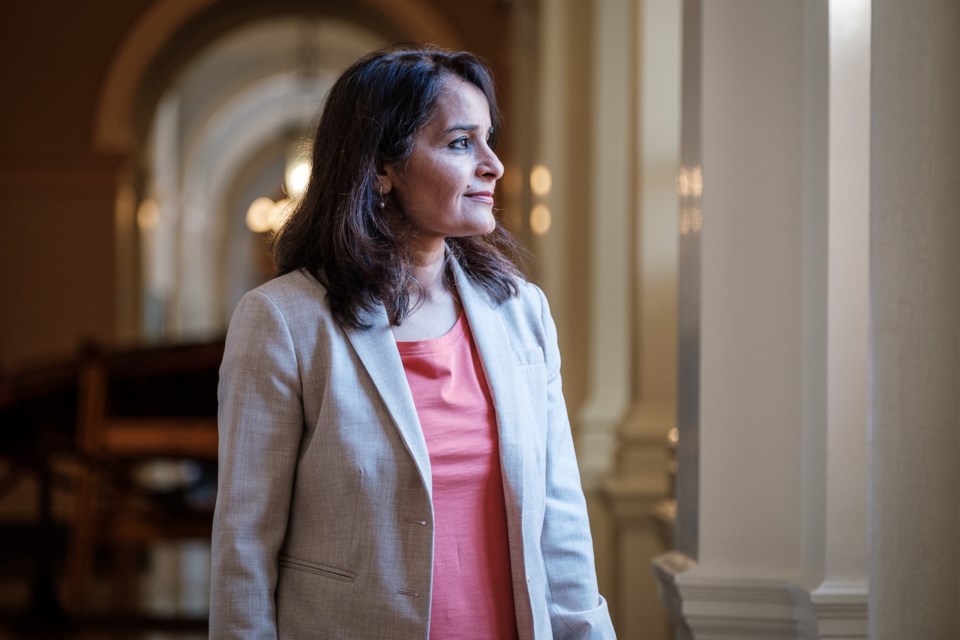Both allies and racialized British Columbians need to become more comfortable speaking about racism; that is one of the messages from .
says most folks balk at the word racism.
"The moment you say racism, it's like an elephant in the room. People are very happy with multiculturalism, people are very happy with the diversity and inclusion; they are very happy and very comfortable with those words, but they are not comfortable with the word racism."
White citizens can react defensively to the word.
For racialized people, the word is heavy.
"It is very, very difficult for me even to talk about it because it makes it very emotional," she said.
"I don't think anybody would ever use ‘racism’ lightly because it's emotionally heavy on people. Very traumatic," she added.
The fact is, though, racist behaviour and attitudes are an issue in B.C. and the pandemic has brought that to the forefront.
"The last two years have been very tough for people, we know that. [With] COVID, people have been worried about their health and everything — jobs, the economy, but also we have seen the rise in racism also," Singh said.
"There is racism in Canada, and it is entrenched in our systems. And whenever we are in a situation of a crisis, these things come out the way we have seen hate crimes going up in the wake of COVID."
Singh, who moved to Canada in 2001, was born in Delhi, India and grew up in Chandigarh, Punjab, India.
Despite efforts to combat racism, she said marginalized communities are being left behind due to systemic racism.
"We know that systemic racism exists within the systems, whether that is health care, policing, education... I'm just naming those because those are the ones that are coming up very openly within our consultations, but that doesn't mean that other organizations or other parts of the government are immune to it. I think racism is everywhere."
Government actions to watch for
To address racism, more data is needed, Singh said.
Thus, is in the works.
It will secure race-based data collection.
"We don't know — when a Black person goes to a health-care facility, what kind of barriers that person is facing. Because we don't collect that [information], we don't have that kind of information. That does not mean those gaps don't exist," she added.
There was and feedback for the legislation.
"We need that disaggregated data to know where the barriers are, where the gaps are," Singh said, adding that she is aware that historically, the collection of such data has sometimes further marginalized racialized people. The legislation will be sensitive to that, she said.
After the anti-racism data legislation, which should be coming to the Legislature in the next few weeks, will be an anti-racism act.
With this act, B.C. will follow Ontario, which already has an act, and , which introduced its own act on March 24
aims to advance that province’s three-year anti-racism strategic plan to combat systemic racism.
"So we would be the third province in Canada to have an anti-racism act," Singh said.
There will be public consultation around the act.
While there aren’t a lot of details yet as to what would be in B.C.’s act, Nova Scotia’s bill commits to “work with marginalized and racialized communities to create a community network and develop data standards to monitor and address systemic hate, inequity and racism,” according to a government news release.
It is complex and challenging work, Singh acknowledged.
Singh said while she is spearheading the anti-racism work in the government, each B.C. government leader has a mandate from Premier John Horgan to centre anti-racism in their work.
"All the cabinet ministers, all the ministers of state, all parliamentary secretaries. He put anti-racism as a mandate for all of them," she said.
While B.C. politics can divide along party lines, Singh said so far her initiatives have been met with support from politicians of all stripes.
"I would be very interested once the legislation is tabled," she said. "I would really like to see what other opposition parties are saying about it."
As much as the government can do, each individual citizen also has a role in combating racism, she noted.
"I think it is important for us to acknowledge our privilege. And I myself, as a privileged person, I might have a lot of biases. Just because I'm racialized does not mean I don't have it; I need to educate myself a bit as well," she said.
"A lot of people say, 'I'm not racist,' but then you have to take two steps ahead and be an anti-racist. Be an ally for a person who's being left behind....Governments obviously will bring the legislation because they have a moral responsibility. But we cannot finish this work without the support of our community partners.... It is time to stand up and speak up."



